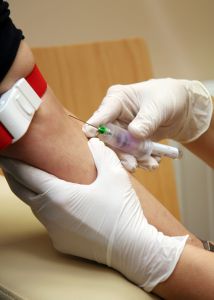Just like your eye and hair color, your blood type is inherited and determined by genetics. It’s important to know which of the blood groups you belong to, as well as your blood type. If you’re interested in receiving routine blood work, or to discuss your blood with a medical professional, stop by your local FastMed Urgent Care. Our state-of-the-art facilities are open 365 days a year, making it easier than ever to receive the quality care you deserve!
The Four Primary Blood Groups
Blood is a fluid comprised of several elements: platelets, red and white blood cells, and plasma. Each of these contributes a unique and important process:
- Red blood cells are responsible for the red color of blood. They also transport oxygen to the body while taking carbon dioxide and other waste away from the body.
- White blood cells move in and out of the bloodstream to help fight off infections.
- Platelets stop excess bleeding by forming clots.
- Plasma transports blood cells along with nutrients, waste, antibodies, hormones, proteins, and other vital bits.
How are blood groups formed?
Each blood group represents the presence or absence of antibodies and antigens within the blood. Since antibodies and antigens are the body’s defense to foreign substances, it’s important to receive the correct blood type during a transfusion.
What are the different blood groups?
The ABO system is used to differentiate the four blood groups:
- Group A has only A antigens present on the red blood cells and has B antibodies within the plasma
- Group B has only B antigens present on the red blood cells and has A antibodies within the plasma
- Group O doesn’t have A or B antigens, but has both A and B antibodies within the plasma
- Group AB has both A and B antigens, but doesn’t have A or B antibodies within the plasma
What can happen if you receive a transfusion from the wrong blood group?
If you receive a transfusion from a blood group that is different than your identified type, your body may attack the foreign cells. This type of response is called a haemolytic reaction. Symptoms of a haemolytic reaction include:
- Bloody urine
- Chills
- Fever
- Lightheadedness
- Pain in back or flanks
FastMed Urgent Care provides services to address a wide array of your basic health needs, including routine blood work. We accept most major insurance carriers, most major credit cards, and offer a savings plan for qualifying patients. To find a FastMed nearest you, visit our locations page today.
